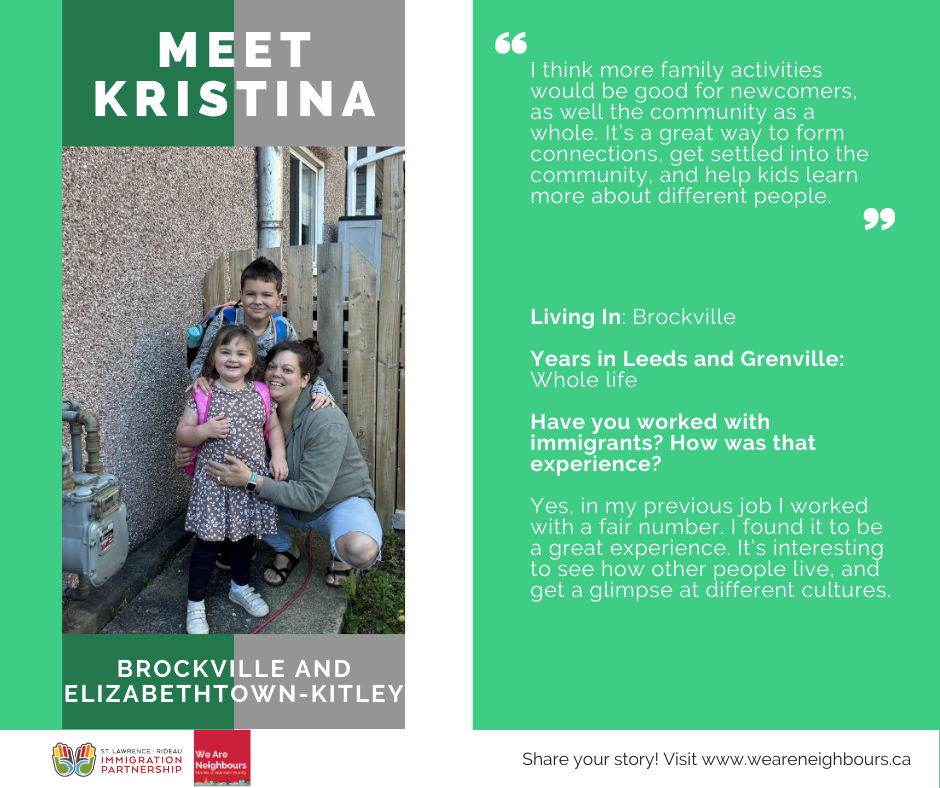A New Road by Wendy MacLean
- weareneighbours
- May 8, 2018
- 3 min read
Updated: Mar 25, 2020

Our region prides itself on its Loyalist roots. It is a good place to come to. In 2017, Brockville welcomed several families from Syria. Refugees for Brockville is a part of a profound movement to continue the heritage of becoming a community where people can feel at home and be part of the change that opens us all, to a new day, together.
I grew up on the West Island of Montreal, which was predominantly English. Quebec, was in the midst of a period of great joy and youthful confidence in a new order. This was marked by massive upheaval and turbulence, as well. Quebec in the 1970’s was an exciting place. The Arts were exploding with celebrations of the political and social ferment of a new identity. The Quiet Revolution was transforming the traditional culture. The role of women was changing. The role of the church was changing. Education and health care were being moved from the oversight of the religious orders to secular authority and accountability.
When I finished high school, along with most of my age cohort, I left the province to go to university. After finishing my Bachelor of Arts and Bachelor of Education degrees, I fulfilled a dream, and went to teach in Northern Quebec (Chibougamau). Many of my students were Cree, whose lives were profoundly affected by the Baie James agreement, which flooded vast areas of land to the north. The year I left, the language law, Bill 101, made it impossible for Cree children to go to English school if their parents had not been to English school. Some of their parents had gone to Residential School in LaTuque. Others had neve been to school because they grew up living on the land.
After 1981 I left the province for many years, to live overseas, and eventually to settle in Ontario.
I never forgot the excitement and joie de vivre of Quebec. When life made it possible to have a new adventure, I returned to Quebec (in 2003). I moved to the Eastern Townships and went to serve as the United Church minister in the Cowansville Area Pastoral Charge.
The arts community in the Townships enriches both the English and French communities, with a rooted, organic, creative scene of music, art, poetry, literature, and food. I was delighted to be part of a writers group. They encouraged me and supported my efforts to have my work published. (Rough Angel/Ange Ecru; Spirit Song in Ancient Boughs, published by Borealis Press) I met a wonderful man, who translated more than my poetry. We were married in 2005.
When I was working with different churches, there was an expression I heard all the time: “We had more people, but they went down the 401.” There was a deep sadness about the exodus of the 1970’s and 80’s, when English businesses and families left Quebec. As Quebec was developing her own voice and a new identity as primarily French, the English started migrating west. “Going down the 401” brought many Quebecers to Brockville.
In the 21st century, there is an echo of this exodus. Parents who stayed in Quebec, when their children left in the 80’s and 90’s to go to university and get jobs, are now moving to be with their families. They don’t want to grow old away from their kids. So, just as their children did, “they go down the 401.”
When I moved to Brockville in 2013, returning to an area where I had lived in the 1980’s, I was amazed to find that my congregation at Christ United Church, in the small village of Lyn, is full of Quebecers. There are several (former) Townshippers in the congregation. To their surprise, many of them have found that they are related from generations back.
We are blessed in Canada to have English and French as our official languages. We are blessed to share a history that reminds us of the power of language, to shape our thinking, to include or exclude people, to give voice or to silence. My husband is pur laine, a Quebecois through and through. “You’ll like Brockville,” I told him. “You’ll have a great accent here!” He is very happy and finds the people of the area “very gentle.”
I have Loyalist roots, and a history that goes back to those tumultuous days of revolution to the south. Long ago, people native to this land showed these Loyalist settlers hospitality and kindness to get them through those hard winters and backbreaking summers. In 2018, as an act of reconciliation, we are being asked to remember the original peoples, and to reconsider our shared histories. We are part of a movement of change, and a new awareness of roots, and voices, and community. This is a new road we must build together, as we travel to a new day.




Comments